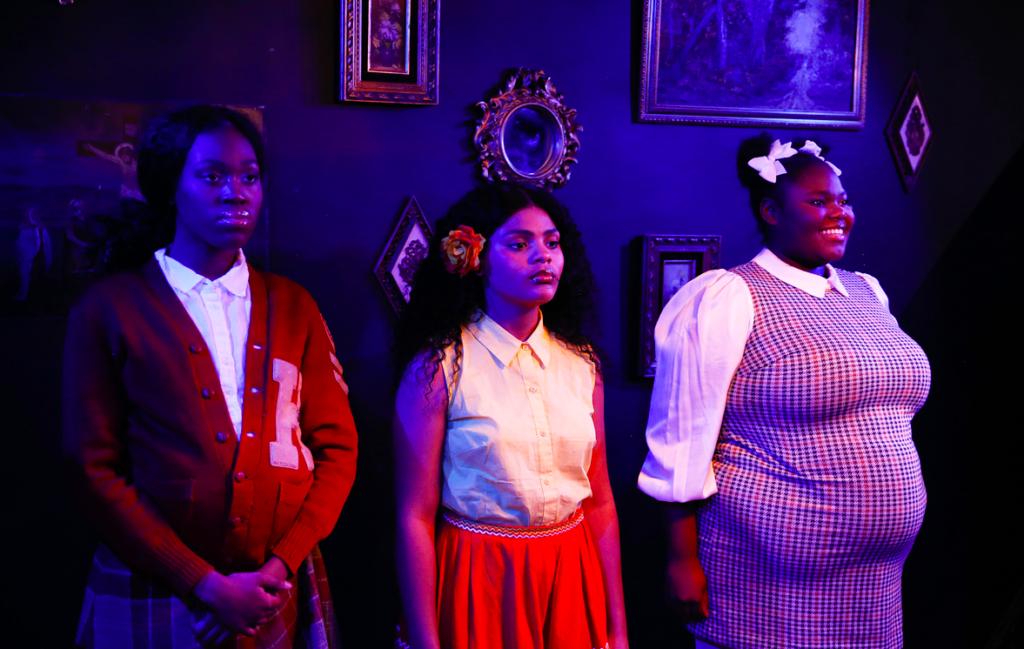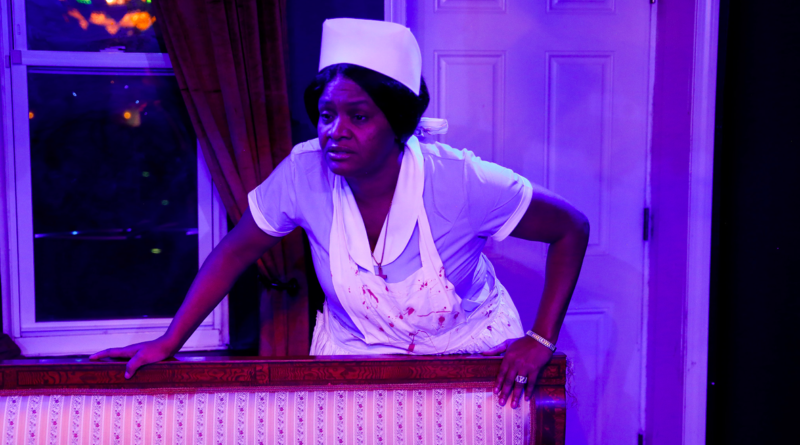INTERVIEW: Desi P. Shelton on the transformative experience of Camden Rep’s new offering
Photo: Desi P. Shelton performs in Unfinished Women Cry in No Man’s Land While a Bird Dies in a Gilded Cage. Photo courtesy of Kamile Kuntz Photography / Provided by Lucy Pollak PR with permission.
Throughout February and March — Black History Month and Women’s History Month — Camden Repertory Theater is presenting a powerful production of the classic play Unfinished Women Cry in No Man’s Land While a Bird Dies in a Gilded Cage by Aishah Rahman. The title by itself can spark conversation and consideration, and it serves as a fitting invitation to the nearly three hours of dialogue that populate this play, which continues through March 12 at Camden Rep’s intimate venue in Camden, New Jersey.
Desi P. Shelton is the founder and artistic director of Camden Rep and also stars in the production, which is directed by Chyna Michele and features music direction by JoJo Streater (a live jazz band shares the stage with the actors). In the show, two storylines play out in a single day, according to press notes. There are teenagers in a home for unwed mothers who need to decide whether to keep their babies, and at the same time, jazz great Charlie Parker is facing death in the stylish boudoir of his wealthy European patroness. That dichotomy should help explain Rahman’s title, especially when one knows Parker’s nickname: the Bird.
“We’ve been trying to do this since 2020,” Shelton said in a recent phone interview. “I try to do a historical African-American woman to span Black History Month [and] Women’s History Month, so I can go from February to March in that slot in the season. I was on faculty at Cheyney [University of Pennsylvania], and one of my students fell in love with the play. And I was like, let me read this one. And I read it, and I was like, oh, wow. I wanted to produce it because it’s like keeping their names alive.”
Shelton realized that many of these classic plays may be known to artistic directors and theater-makers like herself, but the so-called new generation of artists may be unfamiliar with these foundational works.
“And that was my aha moment,” she said. “How do you continue to introduce the new generation or the next generation of women artists and young women artists to these historical playwrights? … It makes you realize that these women, when they were writing, there was no cellphone. You didn’t watch a whole bunch of television. They were writing. They could write, so if you’re looking for it to be wrapped up in 30 minutes or an hour like our television and the new writing, it’s not going to happen.”
For this particular production, Shelton has surrounded herself with many Camden Rep artists who once were members of the company and then moved on to build their artistic lives around the country. Now they are back in Camden, New Jersey, willing to help Shelton and Camden Rep with their shared mission of ensuring Rahman’s words continue to receive an audience.
“We like to be a platform for not only African-American women designers and directors, but also young, educated people,” Shelton said. “Most of them have all come from Camden Rep. They went away and got educated. That’s very important for me.”
Some of the artists surrounding Shelton are graduates of Camden Rep’s Preparing Artists for College Entrance program, or PACE. This 10-week summer program provides 12 high school students “extensive craft development, stipends for teaching elementary and middle school students, and a structured environment during the heightened summer murder rates of Camden City,” according to its official website.
“The goal is for them to be better than you, and they are,” she said. “When I started Camden Rep, I had no clue that they were going to leave me in the dust with their ideas and with their talent and with the ability and with their education.”
For Unfinished Women, Shelton is impressed by Rahman’s ability to offer commentary on the issue of women’s rights in a pre-Roe v. Wade world. Shelton was amazed that this play takes place in 1955, and she has spent a great deal of time considering the choices — or lack of choices — available to the women at the center of the narrative. The characters struggle in the piece on the decision whether or not to put their children up for adoption, and to understand that decision, the actors and creative team members needed to learn about 1950s history.
“And in 1955, no matter if you got pregnant by rape, if you got pregnant by choice, if you were in the middle of your education and you got pregnant, abortion was not a legal option,” Shelton said. “So when you talk about the transformation, and things that you have access to, and privilege that you [have], and choices that you have, yes, it is transformative. … A piece like this totally is transformative for everybody who touches it, even me. I’m like, what in the world did I get myself into? This writing is heavy. It’s deep. It’s piercing.”
By John Soltes / Publisher / John@HollywoodSoapbox.com
Camden Repertory Theater’s production of Unfinished Women Cry in No Man’s Land While a Bird Dies in a Gilded Cage by Aishah Rahman continues through March 12 at Camden Rep’s intimate venue at 445 Mechanic St. in Camden, New Jersey. The play is directed by Chyna Michele with music direction by JoJo Streater. Click here for more information and tickets.


